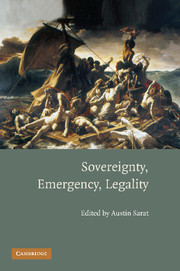Book contents
- Frontmatter
- Contents
- Contributors
- Acknowledgments
- Introduction: Toward New Conceptions of the Relationship of Law and Sovereignty under Conditions of Emergency
- 1 The “Organic Law” of Ex Parte Milligan
- Comment on Chapter 1: David Dyzenhaus, “The ‘Organic Law’ of Ex Parte Milligan”
- 2 Emergency, Legality, Sovereignty: Birmingham, 1963
- Comment on Chapter 2: “Order” in the Court
- 3 The Banality of Emergency: On the Time and Space of “Political Necessity”
- Comment on Chapter 3: Emergencies, Body Parts and Price Gouging
- 4 The Racial Sovereign
- Comment on Chapter 4: Toward a Nonracial Sovereign
- 5 Should Constitutional Democracies Redefine Emergencies and the Legal Regimes Suitable for Them?
- Comment on Chapter 5
- Index
Comment on Chapter 2: “Order” in the Court
Published online by Cambridge University Press: 07 May 2010
- Frontmatter
- Contents
- Contributors
- Acknowledgments
- Introduction: Toward New Conceptions of the Relationship of Law and Sovereignty under Conditions of Emergency
- 1 The “Organic Law” of Ex Parte Milligan
- Comment on Chapter 1: David Dyzenhaus, “The ‘Organic Law’ of Ex Parte Milligan”
- 2 Emergency, Legality, Sovereignty: Birmingham, 1963
- Comment on Chapter 2: “Order” in the Court
- 3 The Banality of Emergency: On the Time and Space of “Political Necessity”
- Comment on Chapter 3: Emergencies, Body Parts and Price Gouging
- 4 The Racial Sovereign
- Comment on Chapter 4: Toward a Nonracial Sovereign
- 5 Should Constitutional Democracies Redefine Emergencies and the Legal Regimes Suitable for Them?
- Comment on Chapter 5
- Index
Summary
Introduction
When and why do courts insist that the parties before them insist on “following the rules,” despite the evident frailty of those rules or the terrible consequences that following the rules might entail? Why should citizens follow what they, and we, might conclude are patently bad laws – and why should courts insist that they do?
This is an age-old jurisprudential question, of course. It raises questions that have long been with us concerning the scope and legitimacy of civil disobedience, the nature of legal authority, and the proper relationship between law and morality. These questions are ultimately as intractable as they are fundamental.
In his contribution to this collection, Patrick Gudridge helpfully takes a narrower cut at some of these questions. He asks how we ought to think about “constitutional analysis framing contemplation of emergencies, crises, or other unruly events.” The overlap between that narrower question and the broader question when and why courts should insist on obedience to the law is considerable. Emergencies and other “unruly events” are often the moments at which the justification for departing from “orderly ways” is at its most compelling. These moments thus place in stark relief the immanent confl ict between doing the “right” thing and doing the “orderly” thing.
More specifically, Professor Gudridge presents us with what he suggests is an anomaly in Supreme Court jurisprudence. Although he builds on whole sequences of cases, he focuses on two in particular.
- Type
- Chapter
- Information
- Sovereignty, Emergency, Legality , pp. 120 - 135Publisher: Cambridge University PressPrint publication year: 2010
- 1
- Cited by



